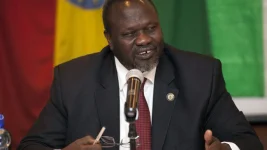South Sudan's political tensions escalated dramatically as opposition leaders demanded the immediate release of First Vice President Riek Machar before potential peace negotiations. The Sudan People's Liberation Army-in-Opposition signaled a potential breakdown of the 2018 peace agreement through a letter to African Union representatives.
Oyet Nathaniel Pierino, the opposition's deputy chairman, forcefully argued that Machar's current house arrest by military intelligence and presidential guards threatens the entire national unity government. He specifically called for the unconditional liberation of Machar and several other detained political figures before diplomatic discussions could proceed.
Multiple international actors have supported the opposition's demands. The United Nations Secretary-General António Guterres directly urged President Salva Kiir to release Machar and restore the existing power-sharing arrangement. Diplomatic missions from several Western nations, including the United States, the United Kingdom, and the European Union, have similarly pressed for Machar's immediate freedom.
The government maintains that Machar is under investigation for allegedly plotting a rebellion. However, regional bodies like the Intergovernmental Authority on Development have expressed serious concern about the arrest, viewing it as a critical threat to the fragile peace agreement. The diplomatic pressure has already triggered significant international responses.
Some nations have begun reducing their diplomatic presence. Germany and Norway have closed their embassies in Juba, while the United States and United Kingdom have reduced staff levels. An African Union panel led by retired Kenyan Justice Effie Owuor is preparing to intervene diplomatically in the unfolding security crisis.
Oyet Nathaniel Pierino, the opposition's deputy chairman, forcefully argued that Machar's current house arrest by military intelligence and presidential guards threatens the entire national unity government. He specifically called for the unconditional liberation of Machar and several other detained political figures before diplomatic discussions could proceed.
Multiple international actors have supported the opposition's demands. The United Nations Secretary-General António Guterres directly urged President Salva Kiir to release Machar and restore the existing power-sharing arrangement. Diplomatic missions from several Western nations, including the United States, the United Kingdom, and the European Union, have similarly pressed for Machar's immediate freedom.
The government maintains that Machar is under investigation for allegedly plotting a rebellion. However, regional bodies like the Intergovernmental Authority on Development have expressed serious concern about the arrest, viewing it as a critical threat to the fragile peace agreement. The diplomatic pressure has already triggered significant international responses.
Some nations have begun reducing their diplomatic presence. Germany and Norway have closed their embassies in Juba, while the United States and United Kingdom have reduced staff levels. An African Union panel led by retired Kenyan Justice Effie Owuor is preparing to intervene diplomatically in the unfolding security crisis.












